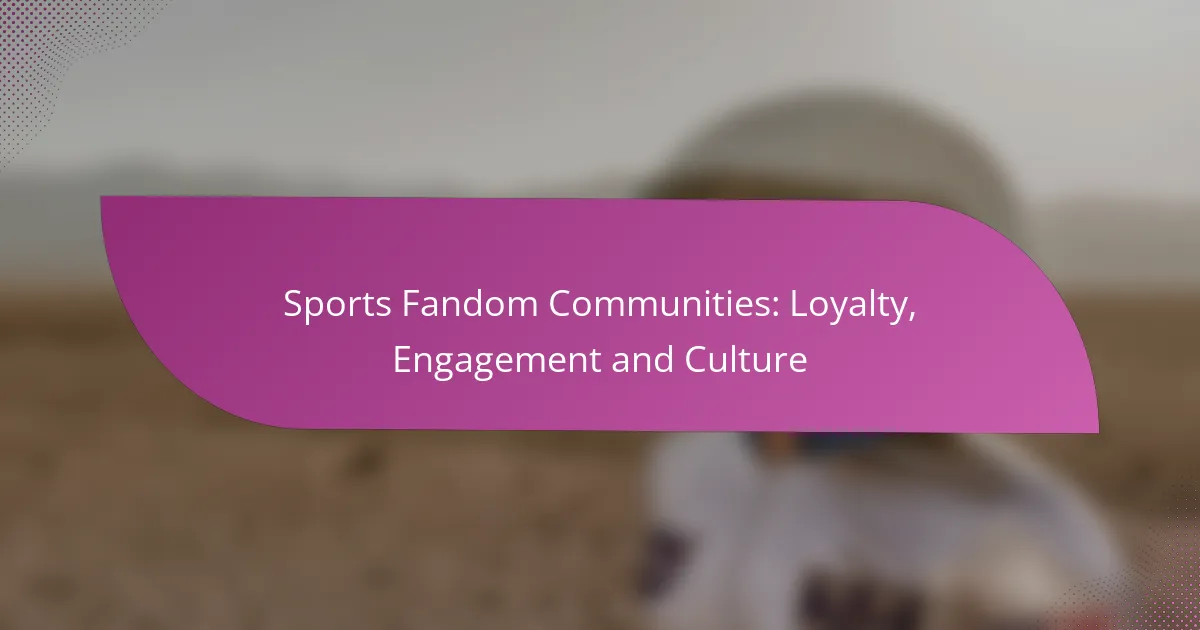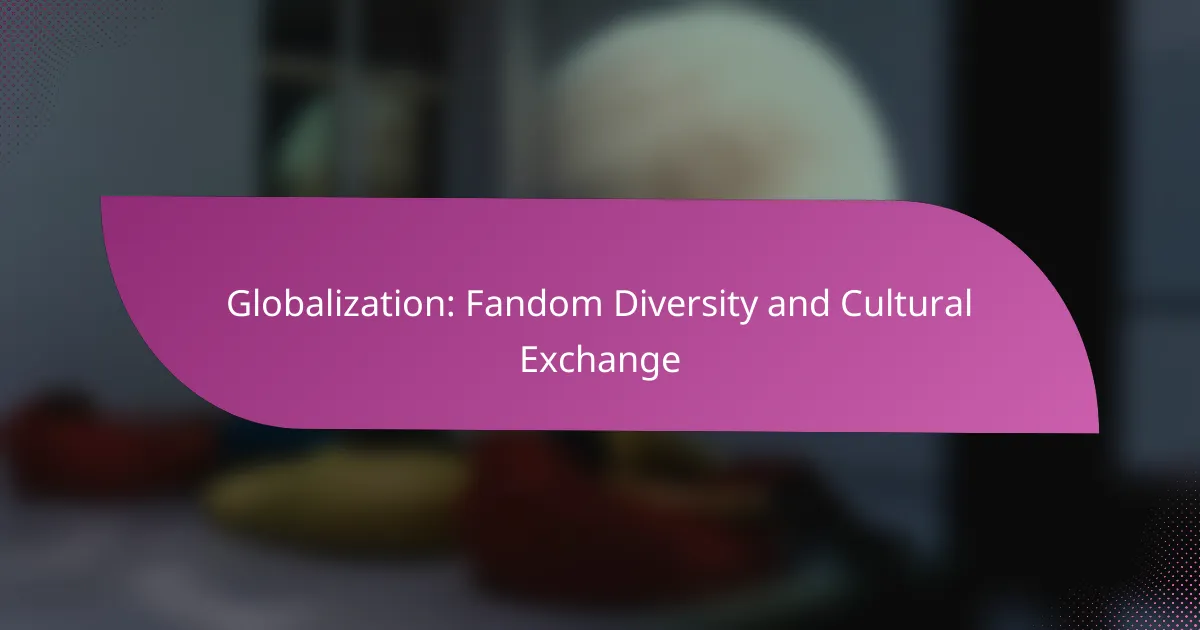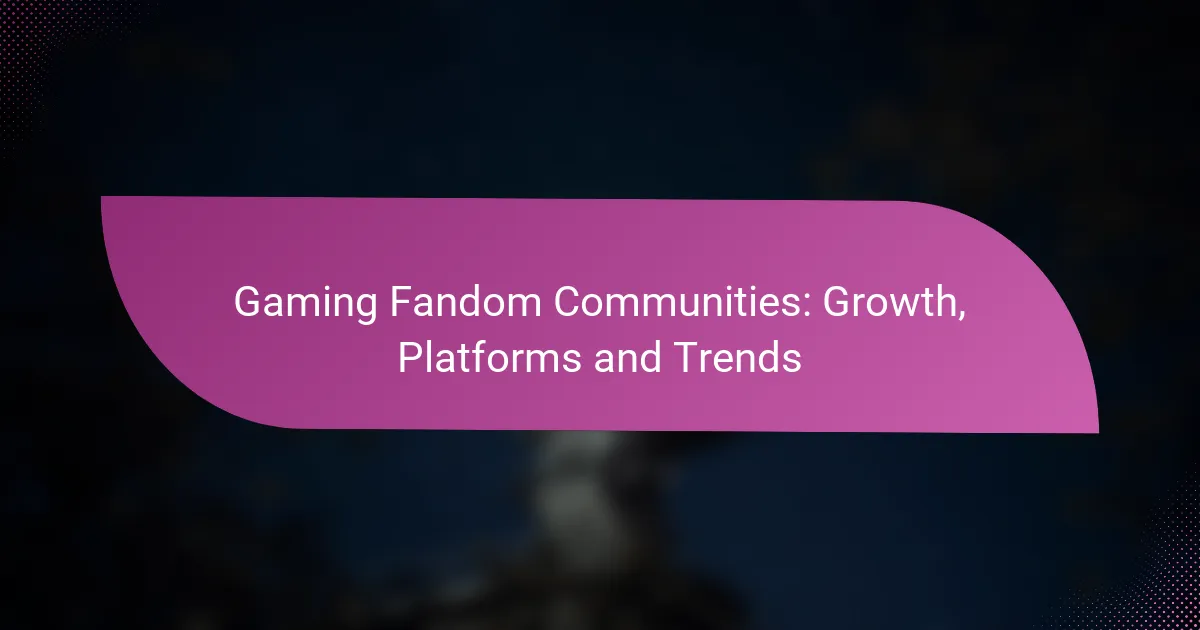Fandom panels offer a unique opportunity for fans to engage in organized discussions about their favorite … Fandom Panels: Expectations, Tips and EngagementRead more
Fandom culture thrives within online communities that provide fans with the opportunity to connect, share, and celebrate their interests. Platforms like Reddit, Discord, and Twitter facilitate diverse interactions, from in-depth discussions to real-time collaborations. As these communities grow, they significantly influence popular culture, shaping trends and impacting storytelling across various media. Through their collective engagement, fans become powerful advocates within the entertainment landscape.
Sports Fandom Communities: Loyalty, Engagement and Culture
Sports fandom communities are characterized by deep emotional connections between fans and their teams, fostering loyalty … Sports Fandom Communities: Loyalty, Engagement and CultureRead more
Virtual Fandom Events: Engagement Strategies, Platforms and Benefits
Virtual fandom events have transformed the way fans connect and engage with their favorite franchises, utilizing … Virtual Fandom Events: Engagement Strategies, Platforms and BenefitsRead more
Globalization: Fandom Diversity and Cultural Exchange
Globalization plays a pivotal role in enhancing fandom diversity by providing access to a wide array … Globalization: Fandom Diversity and Cultural ExchangeRead more
Book Fandoms: Genres, Communities and Engagement
Book fandoms encompass a variety of genres such as fantasy, science fiction, romance, and mystery, each … Book Fandoms: Genres, Communities and EngagementRead more
Fandom Conventions: Top Events to Attend
Fandom conventions in the US draw thousands of enthusiasts each year, celebrating a diverse range of … Fandom Conventions: Top Events to AttendRead more
Authentic Fandom Merchandise: Online Retailers, Marketplaces and Auctions
Finding authentic fandom merchandise online can be an exciting journey, especially when you explore reputable platforms … Authentic Fandom Merchandise: Online Retailers, Marketplaces and AuctionsRead more
Limited Edition Fandom Collectibles: Value, Rarity and Demand
Limited edition fandom collectibles are unique items produced in restricted quantities, often linked to popular franchises … Limited Edition Fandom Collectibles: Value, Rarity and DemandRead more
Fandom Events: Organizing on a Budget, Planning and Promotion
Organizing fandom events on a budget can be both rewarding and challenging, requiring thoughtful planning and … Fandom Events: Organizing on a Budget, Planning and PromotionRead more
Gaming Fandom Communities: Growth, Platforms and Trends
Gaming fandom communities are rapidly expanding, fueled by the rise of streaming services, social media, and … Gaming Fandom Communities: Growth, Platforms and TrendsRead more
How Do Online Communities Foster Fandom Culture?
Online communities play a crucial role in fostering fandom culture by creating spaces where fans can connect, share, and express their passions. These platforms enable fans to engage with one another, collaborate on projects, and support each other in their interests.
Engagement through shared interests
Shared interests are the foundation of online fandom communities. Fans come together around specific topics, such as movies, TV shows, or video games, allowing them to connect over common passions. This engagement often leads to vibrant discussions, where members can share insights, theories, and personal experiences related to their interests.
For example, a community centered around a popular TV series may host forums where fans discuss episodes, character arcs, and plot predictions. This interaction not only strengthens the bond among fans but also enhances their overall experience of the fandom.
Creation of fan-driven content
Online communities encourage the creation of fan-driven content, such as fan art, fan fiction, and videos. This content allows fans to express their creativity and showcase their interpretations of their favorite media. Platforms like DeviantArt and Archive of Our Own serve as popular venues for sharing such creations.
Fans often collaborate on projects, leading to unique works that reflect diverse perspectives within the fandom. This collaborative spirit not only enriches the community but also fosters a sense of belonging among its members.
Support networks for fans
Support networks within online fandoms provide emotional and social backing for fans. These communities often become safe spaces where individuals can share personal stories, seek advice, and find comfort in shared experiences. This support is particularly valuable for fans who may feel isolated in their offline lives.
For instance, a fan community focused on mental health may offer resources and discussions that help members cope with challenges. Such networks can significantly enhance the overall well-being of fans, reinforcing their connection to the fandom.
Collaboration on projects
Collaboration is a key feature of online fandoms, where fans often work together on various projects. These can include organizing events, creating merchandise, or developing fan films. Collaborative efforts not only produce tangible results but also strengthen relationships among community members.
For example, a group of fans might come together to create a tribute video for a beloved character, pooling their skills in editing, writing, and graphic design. This teamwork fosters a sense of accomplishment and deepens their investment in the fandom.
Real-time interaction and feedback
Real-time interaction is a hallmark of online fandom communities, facilitated by platforms like Discord and Twitch. These tools allow fans to engage in live discussions, share reactions, and provide immediate feedback on new content. This dynamic interaction enhances the overall fan experience and keeps the community active and vibrant.
For instance, during a live-streamed event, fans can comment and share their thoughts in real-time, creating a shared experience that amplifies their excitement. This immediacy helps maintain engagement and fosters a sense of community among fans.
What Are the Key Platforms for Fandom Communities?
The key platforms for fandom communities include Reddit, Discord, Facebook Groups, and Twitter. Each platform serves different purposes, catering to various aspects of community interaction, from discussions to real-time communication.
Reddit for niche discussions
Reddit is ideal for niche discussions, offering a variety of subreddits dedicated to specific fandoms. Users can post questions, share content, and engage in conversations with like-minded individuals, making it a rich resource for in-depth discussions.
When participating in Reddit, it's essential to follow subreddit rules and engage respectfully. Upvoting valuable contributions helps surface quality content, while downvoting irrelevant posts maintains the community's focus.
Discord for real-time communication
Discord provides a platform for real-time communication through voice, video, and text channels. It's particularly popular among gaming and anime communities, allowing fans to interact instantly and build stronger connections.
Setting up a Discord server can enhance community engagement. Organizing channels by topic or interest can help streamline discussions, while moderation tools ensure a safe environment. Encourage members to participate in voice chats for a more personal touch.
Facebook Groups for community building
Facebook Groups facilitate community building by allowing fans to share posts, photos, and events in a closed environment. This platform is effective for fostering long-term relationships and organizing group activities.
To maximize engagement, regularly post updates and encourage members to share their experiences. Utilize features like polls and events to keep the community active and involved. Be mindful of privacy settings to protect members' information.
Twitter for updates and trends
Twitter is a fast-paced platform ideal for sharing updates and trends within fandoms. Users can follow hashtags related to their interests, making it easy to stay informed about the latest news and events.
Engaging with tweets through retweets and likes can amplify visibility. Participating in trending conversations and using relevant hashtags helps connect with a broader audience. However, be cautious of misinformation and verify sources before sharing content.
How Do Fandoms Influence Popular Culture?
Fandoms significantly shape popular culture by driving trends, influencing merchandise, and impacting storytelling within franchises. Their collective voice and engagement can alter the trajectory of media and products, making them powerful players in the entertainment industry.
Driving trends in media consumption
Fandoms often dictate what types of media gain popularity, as their preferences can lead to increased viewership and engagement. For instance, shows like "Stranger Things" have surged in popularity partly due to dedicated fan communities that promote the series through social media and fan art.
As fans rally around specific genres or themes, they can create a ripple effect, encouraging networks and platforms to invest in similar content. This trend can lead to a greater variety of shows and films that cater to niche interests, ultimately diversifying the media landscape.
Impacting merchandise sales
The influence of fandoms extends to merchandise, where dedicated fans often drive sales of products related to their favorite franchises. For example, limited edition collectibles or themed apparel can see significant demand, resulting in substantial profits for companies.
Brands that engage with fandoms through exclusive releases or collaborations often experience a boost in sales. Understanding fan preferences and trends can help businesses tailor their merchandise strategies effectively, maximizing revenue opportunities.
Shaping narrative directions in franchises
Fandoms can have a profound impact on the narrative directions of franchises, as creators often listen to fan feedback and theories. This interaction can lead to plot twists or character developments that resonate with audiences, enhancing viewer satisfaction.
For instance, fan campaigns or petitions can influence showrunners to revive canceled series or alter story arcs. Engaging with fans through social media platforms allows creators to gauge audience reactions and adapt their narratives accordingly, ensuring continued interest and investment in the franchise.
What Are the Benefits of Joining Fandom Communities?
Joining fandom communities offers numerous advantages, including access to exclusive content, networking opportunities, and potential collaborations with others who share similar interests. These benefits can enhance your experience and deepen your engagement with your favorite media.
Access to exclusive content
Fandom communities often provide members with access to unique content that isn't available to the general public. This can include behind-the-scenes materials, early releases, or special merchandise. For example, some fan clubs may offer limited edition items or exclusive interviews with creators.
To maximize this benefit, consider joining official fan clubs or subscribing to community newsletters. This way, you can stay informed about upcoming releases and special events that may not be widely advertised.
Networking with like-minded individuals
Fandom communities are excellent places to meet others who share your passions. Engaging with fellow fans can lead to lasting friendships and enriching discussions about your favorite topics. Online forums, social media groups, and fan conventions are great venues for connecting with like-minded individuals.
To effectively network, participate actively in discussions and share your insights. Don't hesitate to reach out to others for collaborations or to simply chat about shared interests. Building these connections can enhance your overall fandom experience.
Opportunities for collaboration
Many fandom communities encourage collaboration among members, leading to creative projects such as fan art, fan fiction, or even group events. These collaborations can be rewarding and help you develop new skills while expressing your creativity. For instance, you might join a group project to create a fan-made video or organize a local meet-up.
When seeking collaboration opportunities, look for calls for projects within your community or propose your own ideas. Be open to feedback and willing to share your talents, as this can lead to fruitful partnerships and a more vibrant community experience.
What Are the Challenges Faced by Fandom Communities?
Fandom communities encounter several challenges that can impact their cohesion and overall enjoyment. Key issues include toxic behavior, intellectual property disputes, and the struggle to balance fandom activities with personal life.
Toxic behavior and gatekeeping
Toxic behavior and gatekeeping are significant hurdles within fandom communities. This can manifest as harassment, exclusionary practices, or hostility towards newcomers, which can deter participation and create a negative atmosphere.
To mitigate these issues, communities should establish clear guidelines for acceptable behavior and actively promote inclusivity. Encouraging open dialogue and providing support for those who experience toxicity can foster a healthier environment.
Intellectual property disputes
Intellectual property disputes often arise in fandoms, especially when fan creations like art, fan fiction, or videos are involved. These disputes can lead to tensions between creators and copyright holders, potentially resulting in legal actions or the removal of fan works.
Fandom communities should familiarize themselves with copyright laws and fair use principles to navigate these challenges. Engaging in respectful communication with copyright holders can also help clarify boundaries and reduce conflicts.
Balancing fandom with personal life
Many fans struggle to balance their passion for fandom with personal responsibilities, such as work, school, or family obligations. This imbalance can lead to stress and burnout, impacting both their enjoyment of the fandom and their overall well-being.
Setting boundaries around fandom activities is crucial. Fans should allocate specific times for engagement and ensure they prioritize their personal commitments. Regularly assessing their involvement can help maintain a healthy balance and prevent fandom from becoming overwhelming.









